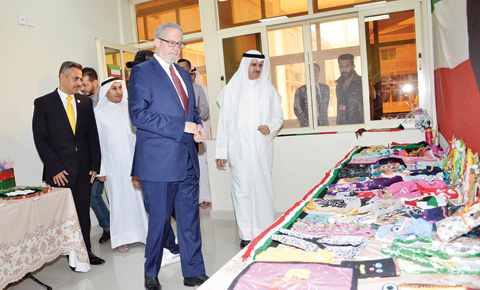 KUWAIT: US Ambassador Lawrence Silverman and Abdullah Al- Mutawa, Deputy Director at the Public Authority for Manpower touring facilities. — Photos by Joseph Shagra
KUWAIT: US Ambassador Lawrence Silverman and Abdullah Al- Mutawa, Deputy Director at the Public Authority for Manpower touring facilities. — Photos by Joseph ShagraKUWAIT: The US envoy visited a shelter for abused and runaway housemaids in Jleeb Al-Shouyoukh yesterday to highlight their plight. The United States Ambassador to Kuwait Lawrence R Silverman met with Abdullah Mutawa, Deputy Director of the Public Authority for Manpower (PAM) and Jaber Ali Al-Ali, PAM Director-International Relations at the PAM-run shelter to mark World Day Against Trafficking in Persons, which is on July 30.
"There are around 20 million victims of human trafficking. Countries from around the world are trying to stop the trafficking and it is our duty to do so as we all have capabilities both in the US and in Kuwait or other countries to do the maximum effort to stop trafficking," Silverman said.
"It means prosecuting individuals or suspects, who are involved in trafficking and providing services to people who are trafficked and to send them back to their respective countries and families so that justice will be served," he added. "Anyone who is deployed even as a domestic helper has rights. Employers should follow the law and if there are people violating the laws they must be prosecuted".
This will not only help correct the problem but will also send a broader message that Kuwait has laws and they should be respected. That also goes to employers keeping their worker's passport, following hours of labor and proper treatment of workers, it must be followed. We are seeing progress in the treatment of workers and even in the victims of trafficking, they are being helped and assisted by Kuwaiti authorities, but more needs to be done, not just in Kuwait but also in other countries," Silverman concluded.
The shelter serves as a temporary home for hundreds of trafficked workers including domestic helpers and others who have been brought to Kuwait illegally or suffered mistreatment and abuse by their employers. Currently there are 166 women staying at the shelter, awaiting clearance of their paperwork and cases in order to turn to their home countries. Inmates of the shelter as of June 2018 include women from the following countries: Sri Lankan-20, Nepal-39, India-8, Ghana-4, Sierra Leone- 3, Cameroon-3, Nigerian-1, Philippines-16, Madagascar-12, Gambia-2, Ivory Coast-37, Mali-1, Benin-8, Burundi-3, Guyana-8 and Burkina Faso-1.
Embassies of the labor exporting countries coordinate with PAM to process all the transfers of abused women while their cases are filed and being heard by authorities here.
Passports and a weekly day off?
When asked by the Kuwait Times on the recent comments by a social media personality regarding the treatment of domestic helpers, the US ambassador said "I do not comment on personalities, but it was good that the issue was publicized so that people will understand."
Sondos Al-Qattan, a popular Kuwaiti makeup artists and Instagrammer with more than 2.3 million followers triggered an uproar when she made comments arguing against domestic helpers retaining their own passports or having a weekly day off - both rights that are protected by Kuwait's domestic labor law.
There are an estimated 620,000 domestic workers in Kuwait, the vast majority of whom are women living in the homes of their sponsors. Many of these often face a range of abuses and mistreatment including no weekly off, delayed salaries, verbal and physical abuse and worse.
In January, the Philippines stopped sending workers to the Gulf state after the discovery of a domestic worker's body in a freezer in Hawally. Her employers - both Arab expats - had fled the country but the news triggered a crisis in Kuwait-Manila. Later, the two countries agreed to end the tension by formally signing a memorandum of agreement.
CORRECTION: The article has been updated to clarify the US Ambassador's statement: "Anyone who is deployed even as a domestic helper has rights. Employers should follow the law and if there are people violating the laws they must be prosecuted."
By Ben Garcia










